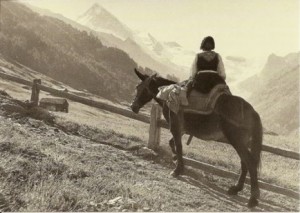Discovering stories
... The mule Liddes ...

Someone in the village of about Liddes 60 mules, qui journellement montent la montagne et la redescendent ; their normal load is 300 books : la taxe d’un mulet, including man accompanying, is 5 batz, outre un batz pour le commissaire qui le commande : but foreigners generally pay something more.
You must have lived in the Alps to feel the total price of the mule. Nature seems to have intended to live to relieve man in his work. About, il se contente d’un peu de foin mêlé de paille hachée : tireless, il marche jusqu’à ce qu’il succombe sous le poids de sa charge : prudent, il choisit ses pas et se tire des endroits les plus difficiles : intelligent, he observes the obstacles that stand before him, et il les évite : finally inexhaustible patience, mistreats his master and forget, without noticing it seems.
Mais avec ces bonnes qualités le mulet a ses défauts : it is stubborn, spiteful, vindictive, less, it is true, with respect to the driver than foreign.
A mule costs four years here 18 with 20 louis ; it is good practice for the mountain up to eight years, after which it is sold in the plain, used for plowing, or less difficult transport. This animal mounts easily, quelque lourde que soit sa charge ; but the descent, it is prone to stumble, surtout s’il chemine isolément ; car, very fond of the company of his fellow, he is bored and paid no attention to the road, quand il est seul : it still works as close as he can to the precipice, what worries and frightens foreign unaccustomed to this frame. Mais c’est une suite de l’intelligence de cet animal : he observed that when loaded, it is exposed to cling or hit against the rocks commonly bordering one side of the road, which causes him to fall. To avoid this, he walks on the side, and therefore the brink.
When the snow is softened by the sun, or summer begins to melt, le mulet est beaucoup plus sujet à s’enfoncer et à tomber : les conducteurs ont alors beaucoup de peine à le relever ; les uns le soulèvent par la queue ; les autres par le col ; if they can not overcome, they take advantage of the discharge, et de le recharger ensuite ; which consumes a lot of time.
The greatest misfortune for the mule, this is when the animal breaks a leg, et cet accident n’est pas rare ; then, not to let him suffer, on l’assomme sur la place : because fractures mule, as those of the horse, ne peuvent se raccommoder : sometimes it rolls over precipices, and if he is fortunate not to perish, falling, it is removed with ropes.
The tactics of the mule is walking exactly in the footsteps of those who have preceded, et il faut le laisser faire : usually it is the enemy of all constraint.

 Show on map
Show on map